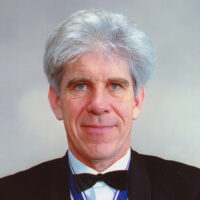
1993 Kyoto Prize Laureates
Biological Sciences(Evolution, Behavior, Ecology, Environment)
/ Evolutionary Biologist
1936 - 2000
Professor, University of Oxford
Between Shoreham and Downe: Seeking the Key to Natural Beauty
1993
11 /11 Thu
Place:Kyoto International Conference Center
Behavior, Ecology, and Evolution: Inclusive Fitness in the Real World
1993
11 /12 Fri
13:10 - 17:30
Place:Kyoto International Conference Hall
An evolutionary biologist who proposed the concept of “inclusive fitness,” to explain the evolution of altruistic behavior in animals that had been a persistent dilemma since Darwin’s time. He beautifully revealed that an individual can increase the number of descendants carrying its own genes by helping and raising its own kin. He also gave a new aspect to the theory of the sex ratio, whereby a mother manipulates the sex of the eggs she lays in order to maximize her own inclusive fitness. His extremely cogent ideas had a revolutionary influence on the whole field of biological sciences.
*This field then was Field of Biological Sciences (Heredity, Development, Evolution, Ecology).
Dr. William Donald Hamilton is a renowned behavioral ecologist who has exerted a revolutionary impact on conventional biological sciences with his concept of “inclusive fitness,” which shed light on the evolution of altruistic behavior, and other extremely influential theories in evolutionary biology, such as expansion of the theory of sex ratio.
The thrust of Darwin’s theory of evolution based on natural selection is that better adapted individuals are able to produce more offspring, and therefore better adapted individuals tend to increase, resulting in the evolution of a highly adapted species. Thus, the general view was that each individual behaves selfishly in order to reproduce itself. However, worker bees and ants do not bear eggs, but nurture the queen’s eggs. Such “altruistic behavior,” which seems to be disadvantageous in enhancing the individual selection, and was for a long time difficult to explain in the context of evolution.
In 1964, Dr. Hamilton developed the concept of “inclusive fitness” and solved the century-old puzzle. Dr. Hamilton has mathematically and precisely proven that a certain percentage of one’s blood relatives possess identical genes to oneself, and thus one can also ensure the increase of one’s descendants by helping and fostering one’a close relatives. For this reason, in the animal world, each individual behaves in a way that enhances its inclusive fitness. This is our understanding today. The model advocated by Dr. Hamilton conforms to reality extremely well, and his theory of kin selection has not only provided a good explanation for the evolution of sterile individuals in social insects, but has also cleared the way for applying the concept of “inclusive fitness” to all life forms. Furthermore, in 1967, Dr. Hamilton proposed a model of “local mating competition” to explain the extreme imbalance of sex ratio in bees and other insects, and greatly advanced the study of animal sex ratios through analysis based on the game theory.
The series of studied by Dr. Hamilton has caused a great transformation in the biological sciences of behavioral science and ecology and has given birth to new fields of study, such as behavioral ecology and social ecology. Even today, Dr. Hamilton’s influence continues to spread into other fields, including anthropology, genetics, embryology, and cytobiology.
Due to such outstanding achievements, Dr. William Donald Hamilton is most eligible for the 1993 Kyoto Prize in Basic Sciences.
Profile is at the time of the award.